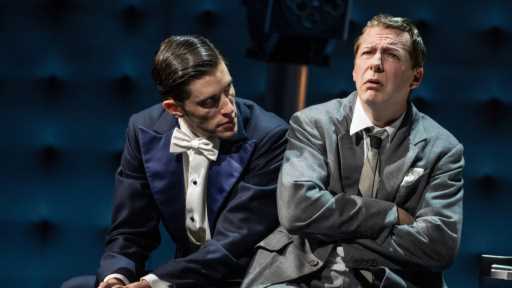Today’s audiences are unlikely to know the name Oscar Levant, the once-famed pianist, composer, comedian and actor at the center of Doug Wright’s new Broadway play “Good Night, Oscar.” Despite that, many aspects of the story, which takes place over the filming of a single episode of “The Tonight Show with Jack Paar” in 1958, might feel familiar: a high-stress taping of a late-night show, big celebrity personalities, exploitation in the name of good television.
Any fan of “The Marvelous Mrs. Maisel” will feel familiar with Paar and generally at home in this world. In some ways, “Good Night, Oscar” even feels like an episode of “Mrs. Maisel” — zany, fast-paced and smartly humorous, with references flying a mile a minute, some battle-of-the-sexes content, sumptuous dresses, well-tailored suits and occasional moments of sincere emotion. Instead of Midge, here we have Oscar, played by Sean Hayes, a one-man show in his own right.
Over the course of 100 minutes, we get a full portrait of Levant. He was a major interpreter of the works of George Gershwin (especially “Rhapsody in Blue”), a film actor (including “An American in Paris”) and a sharp wit famous for his taboo quips as a late-night guest. Alongside the impressive resume, we also learn that he was haunted by the legacy of Gershwin, struggled with pill addiction and dealt with depression, anxiety, OCD and perhaps schizophrenia.
Though the play is based on real events with quotes taken directly from several of Levant’s TV appearances, Wright creates a composite to heighten the tension and speed the pace. Right before Oscar is scheduled to appear on “The Tonight Show,” Paar (Ben Rappaport) is told by Oscar’s wife, June (Emily Bergl), that she finally decided to commit Oscar to a psychiatric hospital. She’s secured him a four-hour furlough to film the episode. Hijinks ensue as Oscar arrives with an orderly (Marchánt Davis), everyone tries to hide the truth from the head of the network (Peter Grosz) and a well-meaning nepo-baby assistant (an excellent Alex Wyse) is persuaded by Oscar to give him some forbidden pills.
The play mostly serves as a showcase for the actor playing Oscar, portrayed with aplomb here by Hayes. The actor changes his entire physicality from his slouched posture to the facial features that contort around his affected accent. The role is undeniably difficult: Once he enters, Oscar carries every scene and almost never leaves the stage. He delivers seemingly hundreds of jokes, traverses an entire emotional rollercoaster of pain and ecstasy and he even plays a lengthy selection of “Rhapsody in Blue” live on stage. (Hayes is a classically trained pianist.)
Though the play cheats a bit by borrowing the emotional heft and sonic satisfaction of “Rhapsody in Blue” (it’s almost impossible not to be moved by it), Hayes’ performance of the tune is as remarkable as it is impressive. Beside the technical achievement of smoothly executing a piano rendition of a difficult opus, Hayes simultaneously manages an acting performance that highlights the excruciating crucible of the moment: A man high on pills, struggling against himself and the resentment he feels at being trotted out, once again, to play a song he both loves and wishes to move beyond. It is a bravura moment and a supreme accomplishment for Hayes as a performer.
At other times, however, Hayes can chew the scenery a bit. His performance is larger than life, occasionally bordering on ridiculous — although perhaps this is intended as realism, calibrated to someone as cartoonish as Levant.
Set designer Rachel Hauck has crafted a space that includes a dressing room with midcentury modern furniture and a soundstage that feels eerily like a padded cell. Emilio Sosa’s costumes are spot-on, getting all the details right — especially June’s complete ensemble. In a performance that matches her costume, Bergl creates a multilayered portrait of June, a complex woman who is strategic, victimized, strong, intelligent and, most importantly, devoted to her husband.
Though the play is filled with 1950s references (nods to Jayne Masfield, Zsa Zsa Gabor, Henny Youngman and Dorothy Parker will likely be lost on some), its frank depiction of mental health, especially for those in the public eye, feels strikingly modern. Levant, particularly in later years, was very candid on TV and in his writing about his mental health and his experiences with addiction and psychiatric treatment, which is historically noteworthy.
Wright’s text highlights the cycle of celebrities being exploited for entertainment, made even more painful when mental illness is involved. We can see a throughline from Oscar Levant to the public figures today who cancel tours because of the mental toll, open up about sobriety or psychiatric treatment, or make statements against the abuses of the industry. We also still see people attacked in tabloids and mocked on late night television for issues surrounding mental health and addiction.
In this, “Good Night, Oscar” seems content to provide a showcase for a notable figure accompanied by musings on topical themes. It could surely go deeper to find more to say beyond the simple, “Look how exploitative this system is.”
But the largest fault of the play may be its conventionality. It is without a doubt a well-made play, with clear structure and stakes, tight pacing, funny jokes and concisely rendered characters. But it does not push the envelope in any way — which is a shame, considering that is exactly what Oscar Levant was famous for.
Still, Hayes’ performance in “Good Night, Oscar” demands to be seen. Though the play itself may not be memorable, Hayes’ acting feat undoubtedly is.
Read More About:
Source: Read Full Article
